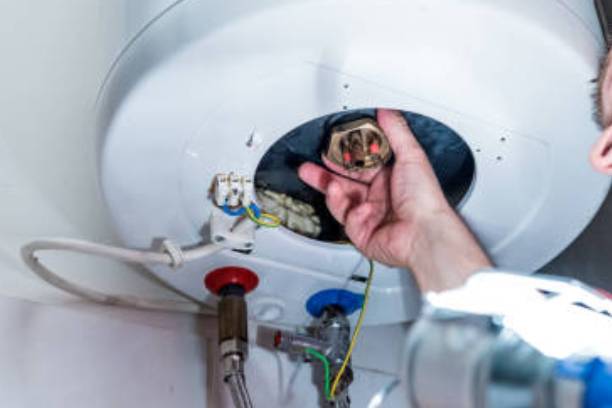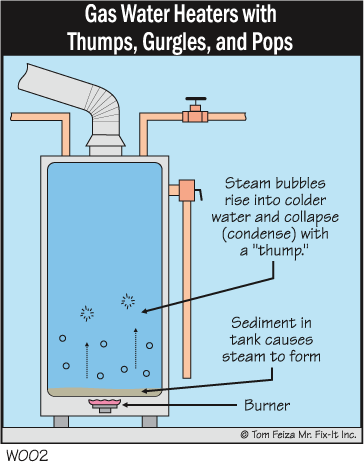Imagine you’re relaxing at home, and suddenly, your hot water heater starts making a high-pitched noise. It’s not just annoying; it’s also a sign that something might be wrong.
You might be wondering if this sound is a minor issue or if it could lead to something more serious. Understanding what’s causing this noise is crucial, not just for your peace of mind, but also to prevent potential damage and avoid costly repairs.
We’re going to dive into why your hot water heater might be making that piercing sound, and what you can do about it. You’ll learn about common causes and simple solutions that can help restore tranquility to your home. So, if you’ve ever felt frustrated by that bothersome noise, keep reading to discover how you can tackle this issue head-on and ensure your hot water heater stays in perfect condition.

Credit: spsplumbers.com
Causes Of High Pitched Noise
Is your hot water heater making a high pitched noise? This sound can be annoying and sometimes alarming. Understanding its causes helps in fixing the issue quickly. Several factors contribute to this unsettling noise. Let’s explore the main culprits.
Sediment Buildup
Minerals in water can accumulate inside the tank. This sediment creates a layer at the bottom. When heated, it causes the heater to make strange noises. Regular cleaning keeps sediment away.
Loose Components
Over time, parts of the heater may loosen. Vibrations during operation can cause these parts to rattle. Regular maintenance ensures components stay tight and secure.
Pressure Issues
High water pressure may lead to odd sounds. The pressure relief valve manages excess pressure. If faulty, it might cause a high pitched noise. Checking the valve can resolve this problem.
Heating Element Problems
The heating element heats the water. If damaged, it can produce unusual sounds. Inspect the element for any signs of wear or malfunction. Replacement may be necessary for a quiet operation.

Credit: cbicorporate.com
Safety Precautions
When your hot water heater starts making a high-pitched noise, it’s more than just a nuisance. It’s a signal that something might be wrong. Addressing this issue isn’t just about restoring peace to your home; it’s crucial for ensuring safety. Before you dive into fixing the problem, there are essential precautions you need to take. Let’s break it down step by step, ensuring you and your home are safe from potential hazards.
Turning Off Power Supply
First things first, turn off the power supply to your water heater. If it’s electric, locate the circuit breaker and switch it off. For gas heaters, find the gas valve and turn it to the ‘off’ position. This step is vital to prevent electric shock or gas leaks while you work. Imagine the relief of knowing you’re not at risk while inspecting the heater!
Are you familiar with your home’s circuit breaker panel? If not, now’s a good time to get acquainted. It’s a small effort that pays off in safety.
Draining The Heater
Once the power is off, it’s time to drain your heater. Connect a garden hose to the drain valve, usually found at the base of the tank. Lead the hose to a safe drainage location like a floor drain or out into your yard. This step helps remove sediment buildup, which might be causing the noise.
Ever thought about how much sediment can accumulate over time? You’ll be surprised at how much a simple drain can improve efficiency.
Be sure to open a hot water tap in your home to allow air into the system, making the draining process quicker and smoother. How satisfying is it to see a straightforward action clear up a puzzling issue?
Remember, handling your water heater doesn’t have to be daunting. With these safety measures, you can tackle the problem confidently. Does your hot water heater have other quirks? Addressing them could save you time and money in the long run.
Inspecting The Heater
Hot water heaters often make a high-pitched noise. This can be annoying and concerning. It’s important to inspect the heater to find the cause. Regular checks can prevent damage and costly repairs.
Checking For Sediment
Sediment buildup affects a heater’s performance. It can cause strange noises. Check for sediment at the bottom of the tank. This is common in areas with hard water. Use a flashlight to inspect inside. Look for any deposits or scale. Flushing the tank can remove sediment. This may solve the noise issue.
Examining Valves And Pipes
Faulty valves can create high-pitched sounds. Inspect all valves connected to the heater. Look for wear or damage. Also, check the pipes. Loose pipes may vibrate and create noise. Secure any loose fittings. This simple step can reduce irritating sounds.
Assessing The Heating Element
The heating element is crucial for water temperature. If it malfunctions, it can make a high-pitched sound. First, turn off the power. Then, open the heater panel. Inspect the element for corrosion or damage. Replace if necessary. This ensures efficient heating and quiet operation.
Quick Fixes For Common Problems
Experiencing a high-pitched noise from your hot water heater can be unsettling. Common causes include sediment buildup or valve issues. Regular maintenance often resolves these noises, ensuring smooth operation and extending the appliance’s lifespan.
When your hot water heater makes a high-pitched noise, it can be annoying. But often, simple fixes can solve the problem. Addressing these issues promptly helps maintain your heater’s efficiency. Here are some quick solutions to common problems.Flushing The Heater
Sediment buildup causes many heater noises. Flushing the heater removes sediment. Turn off the heater and let it cool. Attach a hose to the drain valve. Drain the tank completely. This clears out the sediment and reduces noise.Tightening Loose Parts
Loose parts often cause vibrations. These vibrations create high-pitched noises. Check the heater’s components. Look for loose screws or bolts. Tighten them with a wrench. This simple step can silence your heater.Adjusting Pressure Settings
Incorrect pressure settings cause noise issues. Check the pressure relief valve. Adjust it to the recommended level. If you’re unsure, consult the manual. Correct pressure settings ensure smooth operation.Replacing Faulty Elements
Worn-out elements may create strange sounds. Inspect the heating elements for damage. If damaged, replace them with new ones. Always follow the manufacturer’s instructions. New elements can restore peace and quiet.Preventative Measures
Hot water heater issues can be frustrating, especially strange noises. A high-pitched noise often signals a problem needing attention. Preventative measures ensure your heater runs smoothly. These steps can help avoid costly repairs and extend its lifespan.
Regular Maintenance
Regular maintenance is key to a healthy water heater. Check the heater’s components every six months. Inspect the tank for sediment buildup. Sediment can cause noises and reduce efficiency. Drain the tank to remove sediment if needed. Check electrical connections and the thermostat setting. Adjust them if necessary for optimal performance. A professional inspection every year is also beneficial.
Monitoring Water Pressure
High water pressure can cause a high-pitched noise. Monitor the pressure using a gauge. The ideal range is 40 to 60 psi. Adjust the pressure regulator if the pressure is too high. This reduces stress on the heater. It also prevents damage to pipes and fixtures. Regularly checking pressure helps maintain a quiet, efficient system.
Installing Water Softener
Hard water causes mineral buildup in your heater. This can lead to noises. Installing a water softener can help. It reduces calcium and magnesium in the water. This prevents scale buildup inside the heater. A water softener extends the heater’s life and improves efficiency. It also keeps your plumbing system in good condition.

Credit: summerfield-school.com
When To Call A Professional
A high-pitched noise from your hot water heater signals a potential problem. Sediment build-up or worn-out parts might be the cause. It’s wise to call a professional to inspect and fix the issue, ensuring your heater functions safely and efficiently.
Dealing with a high-pitched noise from your hot water heater can be more than just an annoyance. At times, it might signal an underlying issue that needs immediate attention. While some noises might be resolved with simple DIY solutions, others require professional intervention. Knowing when to call a specialist can save you from potential damage and costly repairs.Persistent Noise Issues
If the high-pitched noise continues even after you’ve tried basic troubleshooting, it’s time to consider professional help. Persistent noises might indicate problems like sediment build-up or a failing heating element. Ignoring these could lead to more significant issues, like inefficiency or even a breakdown. Listening to your hot water heater can be like listening to your body. Just as a persistent cough might need a doctor’s opinion, a persistent noise often needs an expert’s ear.Complex Repairs Needed
Some repairs are just too complex for the average homeowner. If you suspect a problem with the internal components, such as the thermostat or wiring, it’s best to call a professional. Attempting these repairs on your own can lead to further damage or even void your warranty. Think about the last time you tried fixing something beyond your expertise. Remember how frustrating it was when things didn’t go as planned? Save yourself the hassle and call someone who knows what they’re doing.Safety Concerns
Safety should always be your priority. Water heaters involve electricity, gas, and water—elements that can be hazardous when mishandled. If you notice any signs of leaking gas, electrical sparks, or unusual smells, it’s crucial to call a professional immediately. Have you ever thought about the risks involved in handling electrical appliances without proper knowledge? Protect yourself and your home by leaving this to the experts. In summary, knowing when to call a professional can make all the difference. Your hot water heater is an essential part of your home, and ensuring it operates safely and efficiently is crucial. Don’t wait until it’s too late; if you’re unsure, reach out to a professional for peace of mind.Frequently Asked Questions
Why Is My Hot Water Heater Making Noise?
A high-pitched noise usually indicates a problem. It might be due to sediment build-up or a faulty valve.
How Can I Stop The Noise From My Water Heater?
Check for loose parts or sediment. Flush the tank and tighten fittings to reduce noise.
Is A Noisy Water Heater Dangerous?
Not always, but it can signal issues. Addressing noise early prevents bigger problems or damage.
Should I Call A Professional For A Noisy Heater?
Yes, if simple fixes don’t help. A professional ensures safety and proper function.
Can Sediment Cause Heater Noise?
Yes, sediment can cause popping or high-pitched sounds. Flushing the tank usually helps.
Conclusion
Resolving a high-pitched noise from your water heater is crucial. It ensures peace and extends the heater’s lifespan. Regular maintenance can prevent many issues. Listen for unusual sounds often. Address them promptly to avoid bigger problems. Check for mineral buildup and faulty components.
Consult a professional if unsure. Safety should always be a priority. Fixing small issues early saves money long-term. Keep your home comfortable and quiet. Remember, a well-functioning heater is essential. Enjoy warm showers without the annoying noise.





